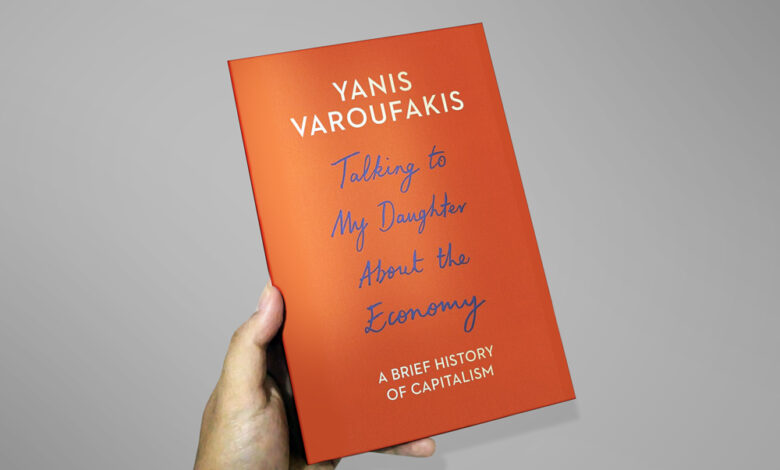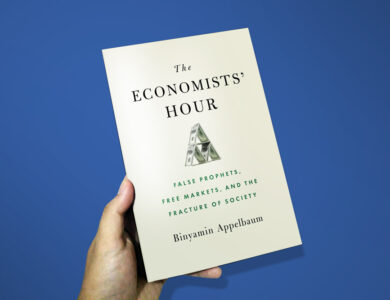Talking to My Daughter About the Economy by Yanis Varoufakis
Navigating the Economic Maze: A Detailed Review of Yanis Varoufakis’s ‘Talking to My Daughter About the Economy

Demystifying Economics for the Next Generation: A Review of ‘Talking to My Daughter About the Economy’ by Yanis Varoufakis
“Talking to My Daughter About the Economy” by Yanis Varoufakis is a compelling exploration of the complex world of economics, presented in a way that is accessible and engaging for readers of all backgrounds. In this enlightening book, Varoufakis uses clear and relatable language to explain economic concepts, inviting us to understand how economies work and their impact on our daily lives. As we delve into this journey, we will explore topics such as wealth and debt, inequality, and the role of banks and governments in the economy. Through Varoufakis’s insightful explanations and thought-provoking discussions, “Talking to My Daughter About the Economy” promises to demystify economics and empower readers with a deeper understanding of the economic forces that shape our world.
Author Background:
Yanis Varoufakis is a renowned economist and former finance minister of Greece. Known for his unconventional approach to economics, Varoufakis has dedicated his career to making economic concepts accessible and understandable to the general public. His work combines rigorous economic analysis with a passion for social justice, making his insights valuable for anyone interested in understanding the economic forces that shape our society.
In-Depth Summary:
“Talking to My Daughter About the Economy” is a comprehensive exploration of the world of economics, presented in a way that is accessible and engaging for readers of all backgrounds. Yanis Varoufakis takes readers on a journey through the complex landscape of economics, revealing the underlying forces that shape our economies and influence our daily lives.
The book begins by introducing readers to the basic concepts of economics, such as wealth, debt, and inequality. Varoufakis explains these concepts in clear and relatable language, using everyday examples to illustrate their relevance to our lives.
Central to Varoufakis’s narrative is the role of banks and governments in the economy. He explains how banks create money through lending and how governments use fiscal and monetary policy to manage the economy. Through these discussions, readers gain a deeper understanding of the mechanisms that drive economic activity and influence our financial well-being.
The book also delves into the issue of inequality, examining its causes and consequences. Varoufakis argues that inequality is not an inevitable result of economic activity, but rather a product of specific policies and practices. He calls for a more equitable distribution of wealth and opportunities, advocating for policies that promote social justice and economic fairness.
Furthermore, “Talking to My Daughter About the Economy” explores the global nature of our economies, discussing topics such as international trade, financial crises, and the impact of globalization. Varoufakis highlights the interconnectedness of our economies, showing how economic events in one part of the world can have far-reaching effects on other regions.
In conclusion, “Talking to My Daughter About the Economy” is not just a book about economics; it is a call to action. Through Varoufakis’s insightful analysis and thought-provoking discussions, readers are invited to question the status quo and envision a more equitable and sustainable economic future.
Analysis:
In “Talking to My Daughter About the Economy,” Varoufakis combines his expertise in economics with a passion for education, creating a book that is both informative and empowering. His clear and relatable explanations demystify complex economic concepts, making them accessible to readers of all backgrounds. By exploring topics such as wealth, debt, inequality, and the role of banks and governments, Varoufakis provides readers with a comprehensive understanding of the economic forces that shape our world.
Themes and Insights:
“Talking to My Daughter About the Economy” explores a range of themes, including wealth, debt, inequality, and the role of banks and governments in the economy. Varoufakis illuminates these concepts with clear and relatable explanations, inviting readers to understand how these economic forces influence our daily lives. Through his exploration of these themes, Varoufakis challenges readers to question the status quo and envision a more equitable and sustainable economic future.
Writing Style:
Varoufakis’s writing style is clear and engaging, making complex economic concepts accessible to a wide audience. His use of everyday examples and relatable language helps to demystify economics, making it a subject that everyone can understand and discuss. By blending rigorous economic analysis with a passion for education, Varoufakis creates a compelling narrative that empowers readers to understand and engage with the economic forces that shape our world.
Recommendation:
“Talking to My Daughter About the Economy” is recommended for anyone interested in understanding the world of economics. This book will appeal to both those new to economics and those with a background in the subject, offering valuable insights into the economic forces that shape our world. Additionally, “Talking to My Daughter About the Economy” provides a compelling call to action, inviting readers to question the status quo and envision a more equitable and sustainable economic future.
Conclusion:
“Talking to My Daughter About the Economy” by Yanis Varoufakis is a comprehensive and engaging exploration of the world of economics. With its clear and relatable explanations, this book demystifies economics and empowers readers with a deeper understanding of the economic forces that shape our world. Whether you’re new to economics or a seasoned economist, “Talking to My Daughter About the Economy” is a valuable addition to your reading list.


